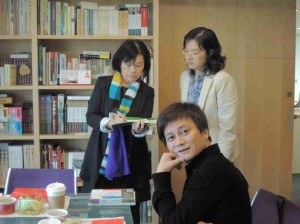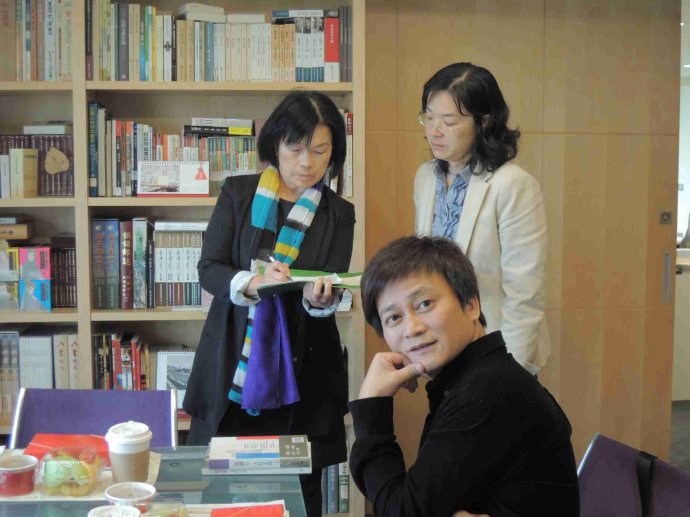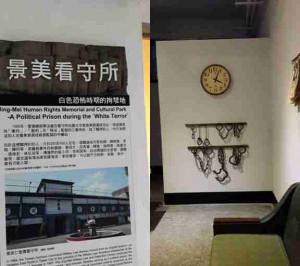
Li Chengpeng visiting Taiwan’s parliament. Culture Minister Lung Ying-tai is to his left. (Li Chengpeng)
China and Taiwan will hold official talks in Nanjing tomorrow, the first since 1949. While the landmark meeting could pave the way for Xi Jinping and Taiwanese president Ma Ying-jeou to shake hands later this year, the week is already off to a rocky start, as China has refused visas to two Taiwanese journalists.
Li Chengpeng, the soccer commentator turned social critic, visited Taiwan last year and reflected on his trip in on his blog. Last January, in the midst of the Southern Weekly protests, Li wore a face mask at his book signing after being told not to speak or ask his audience questions. Here, he considers Taiwan’s ugly side, and why it is better to expose a country’s flaws than present a spotless facade.
The Taiwan You Can See
In 2013–or the 102nd year of the Republic as the locals call it–when the monsoons began, I fled to Taiwan. The wind brushed slowly like a soaked windshield wiper and the clouds pressed low, suitable ambience for a hipster to sit on the stone steps of the old town of Jiufen, watching the fishing boat lights flicker and thinking of Hou Hsiao-Hsien’s words: “Everyone is an island. Everyone is isolated by time, flowing like water.”
It’s an illusion shared by almost every tourist from the mainland. If you really step into Taiwan, you will find that is not that poetic of a place. Taipei is old. Not old like the elaborately constructed nostalgia of the Old Town of Lijiang. It’s “raggedly old.” Narrow streets, shops with cramped entrances, low buildings missing wall tiles. And then there’s that tea-colored glass so loathed by mainlanders in the 1980s. Walking in Dadaocheng, you suddenly come across a building, and it takes you three to five seconds to figure out if it’s being demolished. The government wants to implement a “renovation project” to beautify the city, but the building owners have made a big stink about it, and the plan has been repeatedly delayed. Many city blocks are not even comparable to a mainland county-level city with a bit of money, not say nothing of the famous city of Langfang.
I was hoping to steal a glance at someone like Lin Chi-ling. But I was wrong again. The women dress simply: not much make-up and no high heels to speak of, never mind the ass-high miniskirts of the mainland. Even bustling Zhongxiao East Road is nothing like the area near the China World Trade Center in Beijing, swarming with women carrying Louis Vuitton handbags as if they were an army launching an attack and everyone carried a submachine gun.
Taiwan is not poetic. It’s too chaotic. The day I arrived, several tourists were swept out to sea by the waves. The tourism bureau immediately issued an apology, but the media wouldn’t let it off the hook because saying sorry has no legal heft. The issue heated up and people protested in the streets. The deputy minister of transportation and communication was compelled to lead the director and section chiefs of the tourism bureau in a televised apology. They bowed, heads hung low as if they were murderers. They repeatedly expressed their sorrow and promised to take legal responsibility, accept administrative punishment, fight for 30 million New Taiwan dollars (NT$) to compensate the victims, and transfer to other government positions…
Looking at their bitter faces, I don’t know why, but I thought of the train cars buried in Wenzhou, and the smiling face of Watch Uncle.
To be honest, Taiwan doesn’t have the abundant “scenic resources” of the mainland. The biggest “scene” in Taiwan is the nightly news. It’s not that common for hotels to charge for porn–who needs porn when you can watch people FUCK the government? Anyway, it’s free… Some guy rode his mountain bike on an overpass, the wheel got stuck in a crack in the road and he fell. People protested about the design of the road, which didn’t take into consideration narrow bicycle wheels. The government immediately apologized and installed wider metal plates. Even a mainland public intellectual like me thought they were overreacting. In mainland China, you’re lucky if the relevant department doesn’t inspect you for being overweight and causing the bridge to collapse. And these people have the gall to protest.
Watching these programs for too long inevitably causes aesthetic fatigue. I began to miss Xinwen Lianbo, CCTV’s nightly news show. My Taiwanese friends asked me what kind of program it is. I spent a lot of time explaining, but they didn’t get it. So I explained it in a general way: it’s an entertaining and uplifting news program where the anchors don’t believe what they read, the audience doesn’t believe what they hear, and the reporters don’t believe what they present, but they all pretend they believe it. My friends just stared at me vacantly.
I don’t want to try to understand these thick-headed people. Actually, before I came to Taiwan, I secretly made three wishes. First, to see parliament in session; second, to participate in a protest; and third, to see a government official have a shoe thrown at him. I didn’t have any political agenda. It’s like all those Chinese tourists who visit America to see a striptease, visit Disneyland, and gamble in Las Vegas. It’s all just part of the American tour. Or like a man’s rite of passage. Taiwan is part of the motherland, I’ve gotten so much older–it was time to satisfy my cravings.
My first wish was fulfilled right away. I just exchanged my exit and entry permit for a pass, and I was inside parliament. Nobody asked if I was a spy… They were talking about the budget when I walked in. A female minister stood up and berated the director of the police bureau for ten minutes, while he remained silent. Later I finally heard that there was a police officer who, during an investigation into an illegal shop, mentioned that this case came from the same minister. She thought this meant the police could be retaliating against her. But I noticed that the amount of the money they were arguing about was pretty small, about what a mainland village official owed for pork trotters not long ago.
And so I passed my days, scampering off to parliament or to watch TV. I saw a fat anti-nuclear protester charge from the back row to the front and grab another fat guy at speeds that defy the laws of mechanics; I saw an old gentleman scan a lawn with a metal detector to see if the county head’s brother had built a basement under his mansion. The Culture Foundation originally arranged for me to visit the presidential palace, but I politely declined. I don’t think it’s trendy anymore to wait in line to shake hands with the president. That day, out of boredom, I wandered to the front of the palace and saw a group holding up signs that said “the people’s rage is boiling over” and yelling about collusion between business and government. It looked like it could satisfy my craving. I mingled in the crowd and shouted, “President Ma is incompetent!” Then I thought that wasn’t fair, so I added, “Shame on the Democratic Progressive Party!”… Thus, my second wish came true. It felt good. “Damn me! Think only you Taiwanese will curse your president? I will, too!”
Not until I got to Taiwan did I realize how many Taiwanese truly admire the mainland. They praised its fast-growing economy, the second largest GDP in the world, the boldness of the government, and the beauty of its cities–not like Ma Ying-jeou, who can’t make up his mind and finish building the free trade zone. We argued often, but neither side could persuade the other.
[Culture Minister] Lung Ying-tai arranged for me to see the documentary See Taiwan [Beyond Beauty: TAIWAN FROM ABOVE]. She warned me, “This film is truly worth seeing.” In the dark of the Mei-hua Theatre, a sweet voice said, “Please do not be shocked. If you haven’t seen Taiwan this way, it’s because you haven’t stood high enough.” The film was beautifully shot, each scene filmed from the sky: Alishan, Sun Moon Lake… Slow motion, cross dissolve transitions, lovely music. I started to doze off. Mainland satellite TV stations often airs this kind of government propaganda back-to-back in the wee hours. Zhangjiajie, Jiuzhaigou… All governments enjoy a bird’s-eye view of the world. Just as I was struggling between being polite and staying awake, I got a sudden jolt. The sumptuous scenes had turned ugly. Dark green mountains dug up to reveal bald rocks, streams choked with garbage, forests cut to pieces, two trails of sludge, one white and one red, trickling over Kuan-yin Beach… The scenic film had become a disaster film. The audience started whispering, “What, this is happening in beautiful Taiwan? Why didn’t we see this before?”
The director, Chi Po-lin, says, “I want people to see the ugly side of Taiwan.” He went to great lengths to purchase the aerial filming equipment, and tied himself to the plane to capture the scarcely-seen truth from the sky. He is not a professional director, but a civil servant. He resigned from his position in order to shoot this film. If he had stayed at his job for three more years, he would have earned a NT$4 million pension. But he says he couldn’t wait any longer. His is the most expensive documentary ever produced in Taiwan, at NT$90 million. He even refinanced his house to fund the film.
Everything he’s done is meant to awaken people to the ugly side of Taiwan. I’m afraid a film like this wouldn’t get past the censors on the mainland, because it would ruin tourism and push away investors. But the Taiwanese don’t care. They want to see Taiwan, and they want to bring foreigners to see Taiwan with them. Even the culture minister arranges for visitors from across the straits to see the unbearable… These are their several confidences.
On another occasion, Jiang Yi-huah, premier of the Executive Yuan, thanked the director after he’d seen the film. “This is the gentlest and most honest of wake-up calls. The director is using the lens to protect and bless his homeland. The government absolutely must do something about Kuan-yin Beach.” At that moment, a red-and-white sandal descended on Jiang’s head. A student had thrown it because he wasn’t satisfied with how disadvantaged workers were treated. He was escorted out of the room, but he was not beaten or jailed, nor was it revealed that he had previously stolen a motorcycle, or gotten into street fights, or peeped in the girl’s restroom when he was a boy.
I waited eagerly for Jiang to explode… But this politician was just too good at acting. He asked the security guards not to give the student trouble, and said calmly, “If no one has taken his petition, please hand it to me directly.”
And so my third wish came true. Afterwards, when I found myself arguing with my Taiwanese friends, I would admit that Taiwan does indeed have many problems. I would even admit, with fifty-cent flair, that the mainland has the advantage of concentrated resources to get big things done. But I would also say, “In Taiwan, you can see all the problems; even the ones you can’t see, there are people who will help you see them.”
Unpoetic Taiwan is the Taiwan you can see. Turn on the TV, and you’d think this seething island was about to explode into revolt. But when you walk down the street, all is calm and orderly. No one would raise a fist to get a seat. Listening to parliament, you’d think the opposition would take down the white flag and launch a coup overnight. But the next day they don’t do anything. They just get back to work, spit flying from their angry mouths. Taiwan has weathered over 60 years. The Kuomintang bowed out and then came back again; the Green Party came on the political stage bathed in glory, and then left with its head hung in shame. The cycle repeats. Taiwan is not poetic, but its people have their own rhythm. Chaos is confined to TV and the halls of government, while the streets remain peaceful.
One last thing. Mr. Ch’en Hsin-chi took me to “Love and Mercy Hall.” I thought it was a charity. But when I got there, I realized that it was the old Jing-Mei Prison, where political prisoners were sent during the White Terror. Lin Yi-hsiung, Shih Ming-teh, Bo Yang, Li Ao… all had been jailed there. In the 1960s, Ch’en spent five years there. The reason: freshly graduated from high school, he had a meal with a classmate, who was soon after suspected of having connections with the Communist Party.
Ch’en paid dearly for that one meal. Handcuffs and shackles still hang on the walls of Jing-Mei. The clock forever points to four o’clock in the morning, the hour when prisoners who were sentenced to death were taken away. To this day, Ch’en still wakes up at four every morning. “The shackles made so much noise that every prisoner would be woken up.” When Ch’en was set free, his mother had already gone crazy. She just stared at him vacantly. He said, “Ma, it’s Hsin-chi. I’m back.” His mother shouted, “You go away! Go away! You are not my son.” She grabbed a cup, flung it out the door, and yelled, “Bad man came again for my son!”
Jing-Mei Memorial holds old newspapers riddled with holes. When the prison was in operation, Chiang Kai-shek was producing thought propaganda. Even the song “Not Coming Home Tonight” was thought to be a signal to organize a midnight march. The prisoners were given all kinds of anti-Communist newspapers to read. But Chiang was paranoid that some of the news might be used to counter his propaganda, so the papers gape with wide holes like laughing mouths. For years Chiang denied that there were any political prisoners in Taiwan. He was finally forced to admit the truth under pressure from the American media.
Shackles hang at Jing-Mei Memorial, a detention center during the White Terror. (Li Chengpeng)
It seems that leaders on both sides of the strait were busy.
Some people thought that the prison, the site of so much pain to the Taiwanese people, should be torn down. But eventually, it was turned into a famous museum like the Taipei 228 Memorial Museum, and rousingly named the Jing-Mei Human Rights Memorial and Culture Park. Students are often brought to Jing-Mei on field trips. The victims not only have been compensated, but can also write autobiographies, and are invited to every memorial event by President Ma Ying-jeou. Occasionally, people who are still angry throw shoes at Ma. But no official would dare shut these museums down, because they know they are nothing without the people. They also know that the habit of seeing is deeply ingrained. Anyone who challenges this habit, challenges the entire island population. Someone asked me about the lessons learned from Taiwan’s transition. I couldn’t answer. But I know this: rather than push aside its pain, Taiwan leaves it for all to see. Only when that pain is clear can future pain be prevented.
We always love to quote Archbishop Desmond Tutu: “No future without forgiveness.” but we forget that he also said, “no justice without truth.”
This is the Taiwan you can see. [Source]
Via CDT Chinese. Translation by Junebug.








